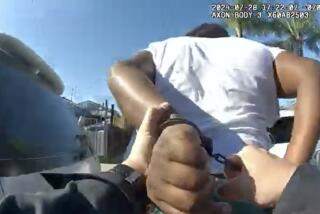Residents’ Views of Incident Mixed in Lake View Terrace
- Share via
Residents from all strata of largely working-class, racially-mixed Lake View Terrace agreed Thursday that the violent crime that plagues the community was no justification for the brutal beating that Los Angeles police officers administered to a man they stopped there for speeding.
However, community leaders--most of whom keep in close touch with high police officials--seemed more forgiving than residents interviewed on the street, many of whom said they, or someone they know, had been mistreated by law officers in the past.
A community of 12,000 sandwiched between Hansen Dam Recreation Area and the San Gabriel Mountains, Lake View Terrace includes comfortable homes with views of the northeast San Fernando Valley and small bungalows. One- and two-acre horse ranches thrive within blocks of neighborhoods where gang members and drug dealers play cat-and-mouse with police. About half the residents are Latino and one-fourth are black.
The beating of Rodney Glen King early last Sunday morning “only reflects the actions of a few policemen,” said Melanie Bernard, co-president of the Lake View Terrace Home Improvement Assn.
Bernard, who, like King, is black, said that in the 20 years she has lived in the community, she has never heard “anyone complaining about being treated with disrespect.”
“If we had, we would have gotten right on it.”
“I think the good rapport we have with the police will continue after this ugly incident is over,” said Arthur Broadus, a longtime black activist in Lake View Terrace and adjacent Pacoima. “This is just a few officers messing it up for the rest of the force.”
But Cory Thomas, a 20-year-old Lake View Terrace resident, was one of many residents who said the beating of King, a construction worker and ex-convict, was unusual only in that it was captured on videotape.
Thomas, who claimed he, too, has been beaten by police, said such incidents “happen all the time. By being black, you don’t know what to expect when the police stop. . . .
“They feel they have the authority to do whatever they want,” he maintained.
King and his family have declined to label the beating a racial incident.
Homeowner Lorena Maciel said the beating of King increased her fear of the police. She said it reminded her of a daytime incident in Pacoima two years ago in which two police officers drew their revolvers on her family after her husband ran a red light.
“I couldn’t believe it,” Maciel, a resident of Terra Bella Street, a hilltop enclave of large new homes, said in Spanish. “We had our two little children in the car. They kept pointing their guns at us. They told us not to move, and I said, ‘Who do you think we are? We’re not robbers.’ ”
And Eddie Thomas, who owns Eddie’s Rib Cage, a soul food restaurant three blocks from the site of the King beating on Foothill Boulevard, said such brutality “has been going on for a long time. It’s just now coming to light.”
Thomas, a 25-year area resident, said that when police pull him over in a deserted area, “I’m scared as hell. You don’t say nothing to them. Whenever they stop me, my hands are up.”
Despite such complaints, community leaders insist that their relations with police officials are harmonious. And when they do hear complaints from residents, brutality is almost never involved.
“Mainly, what irritates residents most is the police attitude that--because we live in a high-crime area--we should not expect the police to solve (all) our problems,” said Lewis Snow, president of the Lake View Terrace Homeowners Assn. “The police attitude is, ‘What do you expect?’ ”
Community leaders also were inclined to presume that police would have behaved the same if King was of any other race.
“My gut level reaction is that, once the adrenaline started flowing, they would have beat the guy up--whether he was black, or white, or whatever,” Snow said.
Jose De Sosa, president of the valley and statewide chapters of the National Assn. for the Advancement of Colored People, disagreed, saying: “I don’t see cases of police inflicting this type of injury on whites. It’s almost always blacks, or other minorities.”
De Sosa said he investigates three or four complaints a month involving police brutality in the San Fernando Valley.
“Almost always the investigation concludes that the police claim the victim resisted and there’s no way to prove otherwise,” De Sosa said. “This time there was a smoking gun.”
Times staff writer Jocelyn Y. Stewart contributed to this story.
More to Read
Sign up for Essential California
The most important California stories and recommendations in your inbox every morning.
You may occasionally receive promotional content from the Los Angeles Times.













